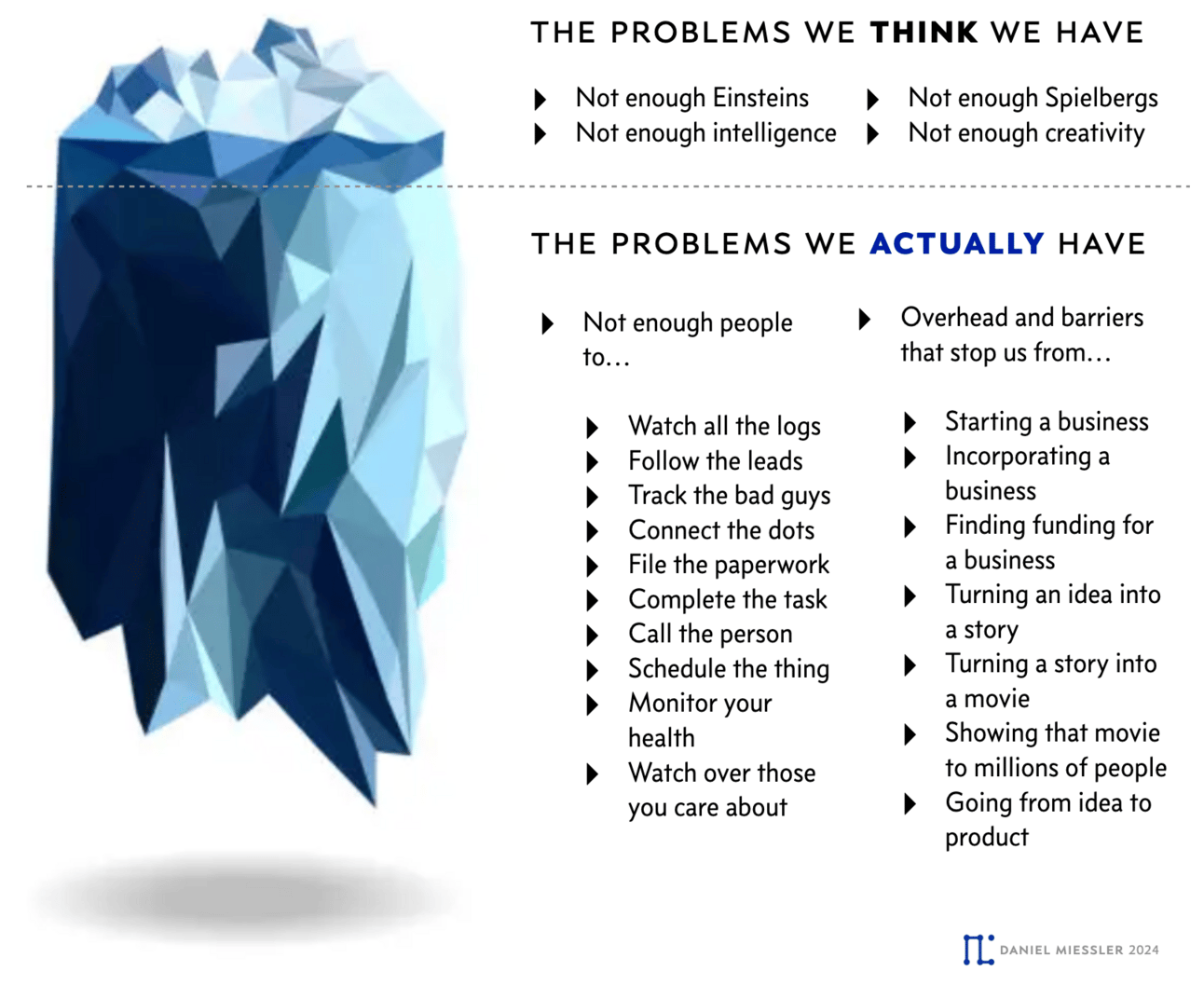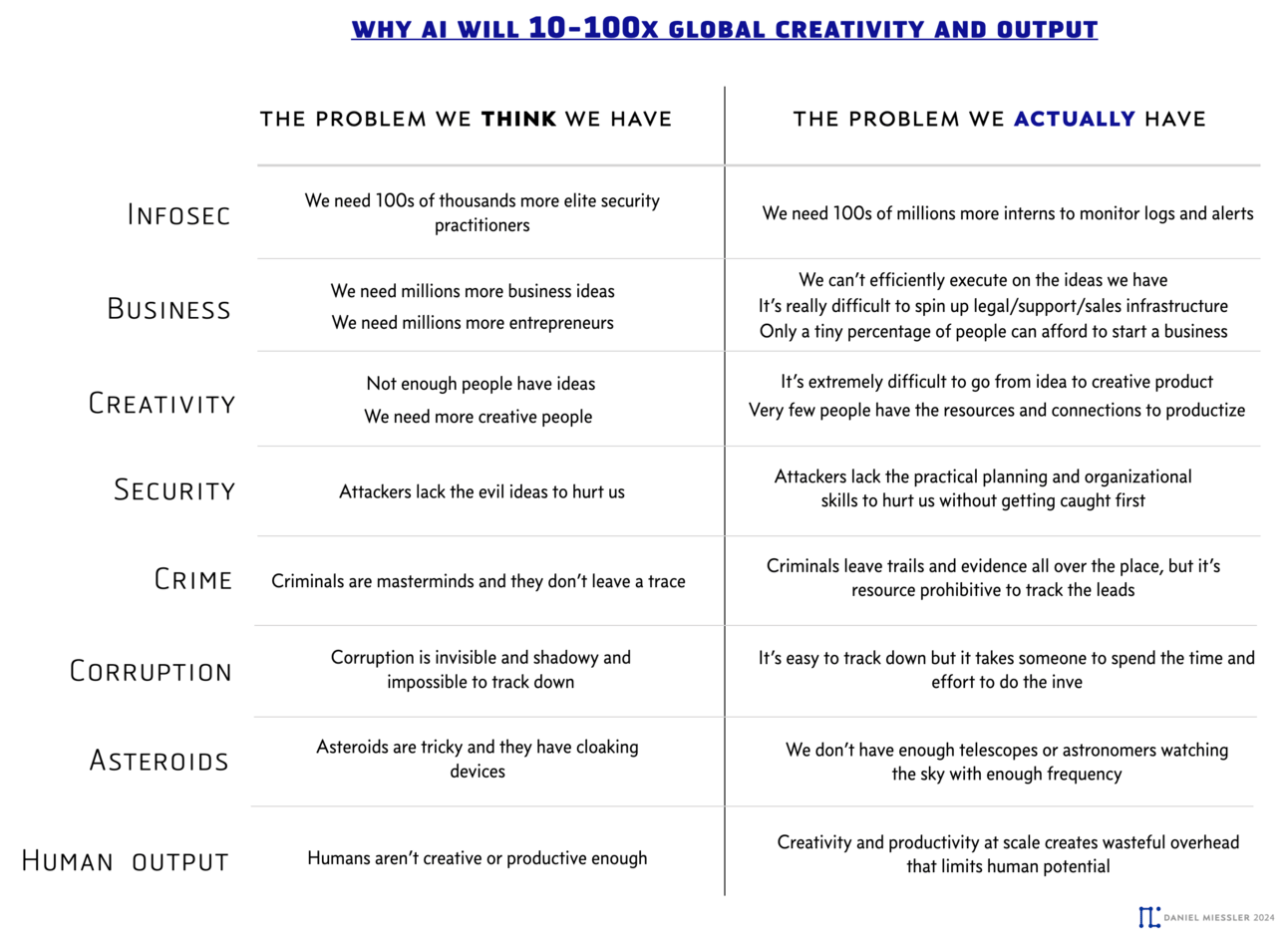How (Specifically) AI Will 100x Human Creativity and Output

The real problems are under the water. Click for full-size.
I just realized something. The reason many people are skeptical of AI’s potential is because they’re confused about what limits human capability.
Many think we can’t accomplish more because we’re not creative enough, or smart enough, or we lack the motivation and follow-through.
But our problem is actually execution. We can capture this execution problem in two main ways.
A Scale problem
A Barrier to entry problem
I put a bunch of examples of these in the chart above.
Scale issues
Scale issues are where the task is pretty easy when limited in size and scope. Like researching two competitors to see what their products and strategies are when you have someone dedicated to it for a few days.
Or Like watching a tiny area in space to make sure it doesn’t have any Earth-busting asteroids. No problem. We pool together our telescopes and take shifts with people watching the images.
❝We need tens of billions more eyes and hands.
The problem we have, though, is that the sky is humungous, and there aren’t nearly enough telescopes or astronomers to watch them. Plus, humans have lives and need to sleep.

Multiple examples of real vs. false problems. Click for full-size.
Too many logs
Same with watching logs and alerts in cybersecurity. If you had one server, and a 3-person security team, you can take shifts, set up some basic automation, and you’ll have it covered.
But at a large corporation, you could be producing terabytes of data per day that needs to be looked at. How does your 40-person team stack against terabytes of logs per day? Especially when they all have other jobs.
❝We don’t need 1,000 more Einsteins.
We need a hundred billion more interns.
It’s the same with other real examples.
People tend to think criminals get away because they outsmart the authorities. It’s not generally true. Criminals leave trails all over the place, but the team responsible for tracking them down is often just one guy.
His name is Jimmy. He’s got high blood pressure, a limp due to a bad right ankle, is going through a divorce, and just got a Corgi. Plus he’s got 19 other cases on his desk.
Finding the criminal isn’t hard, but it’s impossible. There are trails to be followed and clues to be had, but there’s simply nobody to do the work.
Barriers to entry
Barriers present a very different problem. It’s not that there’s too much to do, but rather that only certain people are even allowed to play the game. Maybe you had to be lucky to get exposed to something as a kid, like Bill Gates having access to one of the first computers.
Or maybe it’s being top .01% talented as an artist, and also having parents who let you take some art classes. Or maybe it’s that your family is rich, so you grew up with two highly motivated entrepreneurs as friends in high school. Who were also rich.
❝There are too many Spielbergs working night shift at Walmart who will never get their ideas anywhere near Los Angeles.
We don’t pick our parents, or our innate special talents, or our random childhood friends. Yet these things massively influence whether or not we are part of exclusive inner circles.
There are many Julies in Tennessee, and Varuns in India who have the ideas and the genius to make movies better than Spielberg, but they’re locked out. They don’t know the people. They haven’t been trained. They’re not at the epicenter. And there’s no path to get there.
The problem holding humans back aren’t creativity or motivation.
The problem is scale and barriers.
AI vs. blockers and tasks
And that’s where AI comes in.
AI crushes scale and barriers.
We can’t currently track down all the leads to find most criminals, or to find the people embezzling money, or funding terrorism. Too much noise. Too much research required. And nobody to do it.
But AI will be able to do this very soon.
Using teams of goal-driven autonomous agents, AI will track and follow every single lead, do extensive research on it, bring all that information together, connect the dots, and then write you a report.
Breaking barriers with AI
On the barrier side, there are millions of ultra-creative people scattered through the world with tremendously good ideas just sitting inside their brains right now.
Why? because they can’t draw, they can’t paint, maybe they don’t speak English, and they don’t have any way to get their ideas onto a page.
Well, AI is really good at drawing, and soon it will be really good at video.
❝Soon AI will interview Wang Yi, who grew up on a farm in China with clear dreams of a sci-fi story in her mind, and it’ll create the art and writing to bring the idea to life.
Same with people who have extraordinary reading and documentaries sitting in their heads, but they’re not very skilled yet with writing, or follow through, or recording and editing videos.
These are all barriers. They are obstacles that stop otherwise capable people from getting all the way from to our product.
Corporate scale and barriers
In the corporate world, this means only companies, and especially big companies, can execute on anything.
That’s because, ultimately, the game comes down to who has the eyes, brains, and hands to actually do the millions of tiny motions and menial tasks required to turn an idea into a product.
AI cuts directly into both of these issues. It will give scale to the individual and the small five-person team, and it will give execution capability to hundreds of millions of creative people. People who never had access to a computer, or a studio, or didn’t know how to draw, or write a book, or make a movie.
But now they can.
Suddenly, all of the ideas for a business, or for a comic or a film, won’t be stuck in peoples’ heads anymore. They won’t be the theoretical thing that rots in their mind as they work their swing-shift in a factory or warehouse somewhere.
This is how AI will 100x human creativity, and why you should be a lot more excited about it than you are right now.
AI is not a big deal because it is technology. Forget technology.
AI is not a thing. It’s an enabler of a thing. It’s an accelerator of a thing. It’s a magnifier of a thing.
And that thing is human creativity.